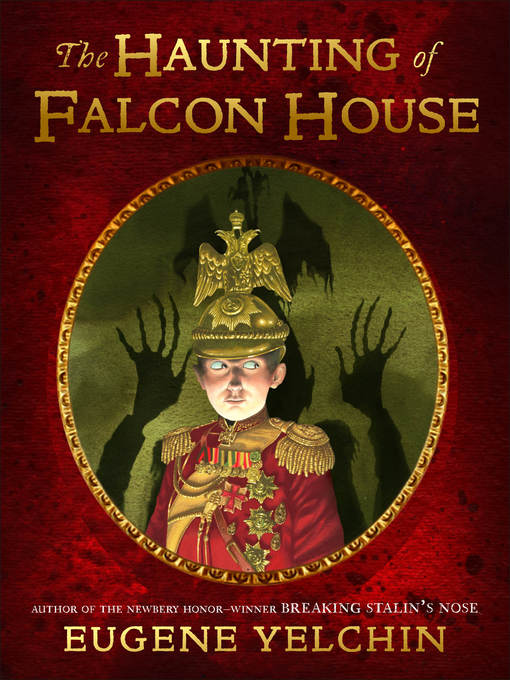
The Haunting of Falcon House
فرمت کتاب
ebook
تاریخ انتشار
2016
Lexile Score
790
Reading Level
3-4
ATOS
5.5
Interest Level
4-8(MG)
نویسنده
Eugene Yelchinشابک
9781627796606
کتاب های مرتبط
- اطلاعات
- نقد و بررسی
- دیدگاه کاربران
نقد و بررسی

July 4, 2016
Yelchin (Arcady's Goal) sets his imaginative, layered mysteryâprefaced by a tongue-in-cheek opening note on the story's purported originsâin late-19th-century Saint Petersburg. Twelve-year-old Prince Lev Lvov, who loves drawing and his mother in equal measure, has been called by his paternal aunt to take up his "noble duties" at the family's Falcon House. On his journey he has an unsettling experience: the face of an unknown boy replaces his image in the dark train window. At Falcon House, events unroll with an odd mix of creepiness and comedy: Aunt Olga and her servants are all broad characters who would be at home in a Dahl novel, while the mysterious boy comes and goes with disconcerting speed. As Lev begins to question the tradition of serfdom and his role as master of Falcon House, he also undergoes strange spells of uncontrollable sketching. Finally revealing Lev as an unreliable narrator, Yelchin leaves his fate open to speculation. Offbeat, smudged sketches play a peculiar yet effective counterpoint to the evocative language, and helpful historical notes are included. Ages 9â12. Agent: Steven Malk, Writers House.

Starred review from May 1, 2016
A "found" Russian manuscript recounts a late-19th-century haunting.Prince Lev Lvov is apprehensive about leaving his beloved mother when he is summoned to St. Petersburg to take up his aristocratic responsibilities in the impossibly cavernous Falcon House. Upon arriving, the dreamy, artistic 12-year-old meets his termagant aunt and an odd assemblage of servants, all of whom remark on Lev's resemblance to his dead grandfather--in whose creepy study his aunt insists he sleep. Lev is unsettled to discover his hand possessed when he sits down to draw to comfort himself. Those drawings, smudged and torn, provide eerie accompaniment to the text. The mysterious young Vanyousha offers Lev companionship but provokes more questions. Adding a further layer of weirdness, Yelchin positions the story in a "translator's note" as a document he found as a child. The story is both simple--a ghost story--and as complex as the country it rises from, offering glimpses of Russia's unique and brutal history in its examination of the institution of serfdom, just recently abolished in Lev's time, and its exploration of the role of art as a vehicle for liberation. Middle graders unfamiliar with that history will be intrigued by the ghost story and the compelling setting, and explanatory notes both provide context and help to prepare them for such books as Candace Fleming's The Family Romanov (2014) and M.T. Anderson's Symphony for the City of the Dead (2015) later on.Eerie and effective. (Historical fantasy. 9-13)
COPYRIGHT(2016) Kirkus Reviews, ALL RIGHTS RESERVED.

August 1, 2016
Gr 5-8-When called to live in his family's ancestral home in St. Petersburg, Russia, 12-year-old Prince Lev is apprehensive. Becoming heir to a foreboding estate that he's never seen is daunting enough, and it is his first time leaving his mother. Add an aunt who can be harsh to say the least, the misrepresented memories of his glorified grandfather, and a night in a haunted study, and it's no surprise that Prince Lev is slightly anxious. But he soon develops a friendship with a mysterious boy who is hardly what he seems. Through a cast of thoroughly quirky characters (with often conflicting accounts), Lev learns the truth about his not-so-honorable grandfather, uncovering some unsettling family secrets and freeing the household from possession along the way. Yelchin introduces czarist Russia to young readers through the use of endnotes and footnotes, a novel albeit uncommon method for this readership. While enlightening, much of the historical content will be missed by children unfamiliar with this technique. Readers will enjoy the budding friendship, and the ghost story/mystery is compelling. Absolutely nothing is overlooked-from plot similarities in the author's introduction to the haunting illustrations, which appear to be drawn by the protagonist. Certainly a different sort of book, this is one that takes time to digest and fully appreciate. VERDICT A unique historical mystery from a celebrated children's writer and illustrator; a great option for classroom discussion and a jumping-off point for further exploration of Russian history.-Rebecca Gueorguiev, New York Public Library
Copyright 2016 School Library Journal, LLC Used with permission.

Starred review from June 1, 2016
Grades 3-6 *Starred Review* When young Prince Lev Lvov receives an invitation to the noble Falcon House, he knows he must leave his country home, his cat, Woolly, and his mother behind. It's not until after three days of train travel that Lev arrives at the dark and decrepit manor where strange things are afoot; Lev's aunt, Olga Lvovna, is ashen and stern, and a gaggle of jittery servantswhom she repeatedly refers to as villains lurch at her every word. What's more, Lev, the spitting image of his late grandfather, is expected to uphold that grandfather's hard-nosed legacy. Isolated in an ancient study, Lev is lonesome, homesick, and utterly fearful. Or so he is until he meets Vanyousha, a sheepishand mysteriousservant boy, and the two bond over their love of art, as well as their solitude. Inspired by a peculiar bundle of illustrations discovered by a young Yelchin (Newbery Honor Book Breaking Stalin's Nose, 2011), the novel's 56 minichapters are interspersed with beguiling ink sketches of everything from star-soaked skies and stark graves to pitchforks and dozing kittens. The narrative itselfaccompanied by useful footnotes for obscure phrases like lorgnette and Corps des Pagesis by turns wide-eyed, inquisitive, and earnest. This is a haunting tale at its very best.(Reprinted with permission of Booklist, copyright 2016, American Library Association.)

























دیدگاه کاربران